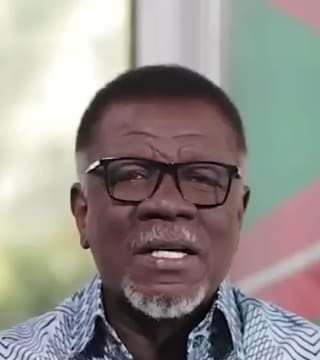Mensa Otabil - A Sense of Mission (11/06/2025)
Exodus 13: 19: "And Moses took the bones of Joseph with him, for he had placed the children of Israel under solemn oath, saying, 'God will surely visit you, and you shall carry up my bones from here with you.'"
It's a very delicate observation we make here in the whole process of this massive Exodus and nation- moving, organizing people to move, and organizing themselves into an army. The Bible pauses to make us see this very interesting event. Joseph was the one through whom the tribal families of Israel entered Egypt in the first place. He started his life there as a slave and worked his way up, eventually, by God's grace, to become the prime minister of Egypt. He was a very powerful person in Egypt; he organized the nation and oversaw the economic prosperity of Egypt. Through him, his whole family came into Egypt; they were given the land of Goshen. So, during the time he was alive, Israel was in good hands, and things were working well. But Joseph also saw that there was going to be a time of transition, and so he had requested that his bones be taken along when Israel would leave Egypt.
Now, this is over 300 years after the death of Joseph, and the Bible notes that Joseph's bones had to be carried along. Of course, when it says "his bones," it is because the Egyptians had a way of preserving dead bodies and making mummies out of them. This would most likely refer to the mummified remains of Joseph that were carried along. But it also tells you that the people of Israel, in spite of all their poverty, had been very mindful of history and the importance of preserving history. For over 300 years, they preserved the remains of Joseph. They were going through hunger, they were going through starvation, they were being beaten, they were dying, but they preserved the remains of Joseph. That means they were very particular about history, about their past, and about their future. A nation that does not understand its past cannot engage with its future. It is out of the roots that we bear our fruit, and they understood their roots were Joseph. He brought us here, and no matter what we're going through, his bones must be preserved. That's a very important observation.
The second thing I want you to note is Joseph's own sense of mission. During the time he was alive, Israel was the preferred community in Egypt; they were given their choice land in Goshen. But Joseph also understood what God had said to Abraham years ago: that his children would be in a foreign land, they would suffer, and they would come out. So, Joseph was a man of prophecy; he was a man who was sensitive to God. He understood what God had said to his great-grandfather, and so he knew that one day the Egyptians would turn against the Israelites. He foresaw that, and he also foresaw that one day God would deliver the people of Israel from Egypt. What a glorious observation! And so, Joseph said, "When that day of deliverance comes, I don't want to be buried here; I don't want to remain in this strange land. I want to be in the land of promise. I want to be gathered to the place that God showed my great-grandfather and the place that God has promised us as a nation."
When the time came, the people remembered the prophecy of Joseph from about 350 years ago and went for his bones, carrying them along with them into the promised land. What a beautiful observation of how we can preserve history and still move into the future.
Let us pray. Say with me: Heavenly Father, you are faithful in all your ways. By faith, I receive all that you have promised me. In Jesus' name, amen and amen.

